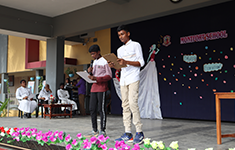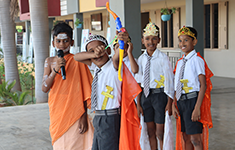Indian Talent Exams
These exams help students to gauge their academic abilities and identify areas of improvement. Participation in Indian Talent Exams encourages a competitive spirit and enhances problem-solving skills.
Call anytime
Send email

Montfort Senior Secondary School exposes students to various talent exams to prepare them for the present and future competitive world. The students receive training from well-experienced teachers to excel in these exams.
These exams help students to gauge their academic abilities and identify areas of improvement. Participation in Indian Talent Exams encourages a competitive spirit and enhances problem-solving skills.
The Science Olympiad Foundation (SOF) exams focus on subjects like Science, Mathematics, English, and Computer Science. These exams aim to promote scientific reasoning and logical thinking among students, preparing them for higher academic challenges.
These competitive exams provide students with the necessary exposure and practice to excel in national and international level competitions, building a strong foundation for their academic and professional futures.
Subjects of Study for Stds. I to X
Subjects of Study for Stds. I to X
Subjects of Study for Stds. I to X
Under Work Experience, Computer Science is offered. Students can opt for this from Std. I to Std. X.
Courses of Study for Std. XI
Courses of Study for Std. XI
Courses of Study for Std. XI
This academic structure aims to provide a balanced and comprehensive education, preparing students for both secondary and senior school certificate examinations.
Students can learn various musical instruments and styles, including Keyboard, Violin, Carnatic, and Vocal music. These activities help in nurturing musical talents and fostering a love for the arts.
The school offers training in both Bharatanatyam and Western Dance, providing students with opportunities to explore different cultural dance forms and enhance their physical coordination and expression.
Silambam: This traditional martial art form helps in improving physical fitness and self-defense skills.
Taekwondo: Students are trained in this Korean martial art to develop discipline, self-defense, and physical fitness.
Yoga: Yoga sessions help students maintain physical and mental well-being, promoting relaxation and mindfulness.
Skating: Students can learn and practice skating, which enhances balance and agility.
Table Tennis: The school offers facilities for table tennis, promoting quick reflexes and strategic thinking.
Handball: Participation in handball helps in building teamwork and physical endurance.
Athletics: Various athletic activities are conducted to develop students' physical strength and competitive spirit.
Basketball: Training in basketball fosters teamwork, coordination, and physical fitness.
Volleyball: Volleyball sessions improve students' agility and team collaboration.
Football: Football training helps in developing strategic thinking, teamwork, and physical stamina.
These extracurricular activities are designed to provide a holistic development experience for students, encouraging them to explore and excel in various fields beyond academics.



If a student is found lacking the ability to cope with the workload of the succeeding class, they may be allowed to repeat the year. If, after repeating the year, the student remains unfit for promotion, they will be removed from the rolls.
Education is a continuous process. In line with CBSE policy, student performance is reviewed throughout the year by conducting tests and examinations. Assessment is a continuous process and not confined to term examinations alone.
Promotions are based on the average of five exams conducted throughout the year, along with the annual exam. Character and discipline are also considered in the promotion decisions.
These co-curricular activities are designed to complement the academic curriculum, ensuring a well-rounded education for students.
Review your children's textbooks to understand what they are learning in school.
Reinforce what children are learning by having them teach you their newly acquired skills.
Praise their efforts, not just their accomplishments.
Emphasize values such as caring, loyalty, trust, honesty, respect, and responsibility.
Use newspapers as "family" textbooks to discuss current events from the world, national, and sports pages.
Limit TV watching to selected programs, discuss these programs with your child, and ask open-ended questions about what you watch together.
Show interest in your children's lives by asking about school, teachers, friends, and listening attentively to their responses.
Engage in physical activities as a family, such as bike rides or after-dinner walks several times a week.
Visit the school and get to know your children's teachers and the Principal.
Be aware of what is in your children's school records. Ask for clarifications and voice any concerns.
Plan family activities that relate to your children's studies, especially during exam times.
Understand that making mistakes is part of parenting. Children also make mistakes and often forgive more readily than adults.